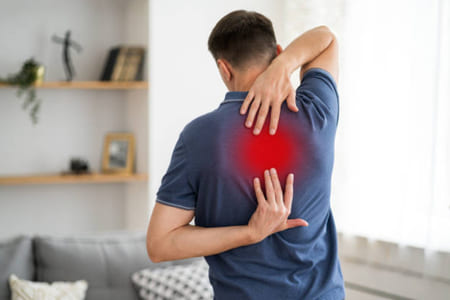Is Upper Back Pain More Serious than Lower Back Pain?
 Is upper back pain usually serious? Typically not. Upper back pain most often is caused by strains or muscle tension, and not because of an issue with the spine. However, upper back pain can be a warning of serious issues and should result in you getting prompt medical attention.
Is upper back pain usually serious? Typically not. Upper back pain most often is caused by strains or muscle tension, and not because of an issue with the spine. However, upper back pain can be a warning of serious issues and should result in you getting prompt medical attention.
Why is upper back pain not usually a spine issue?
While most people think of the spine as one long unit, doctors see the spine as being in three parts: the cervical spine (neck), thoracic spine (upper and mid back), and lumbar spine (low back).
The thoracic spine doesn’t move much, because it’s connected to the ribs and sternum, making it pretty stable and not so likely to suffer an injury. It’s why we can usually expect upper back pain to be about muscles and not the spine.
When is upper back pain actually serious?
Most often this is caused by traumatic injury, but it can also be the result of a degenerative bone disease.
Traumatic injuries to the upper back can do harm to the spinal cord, for example, an injury sustained in a car crash. This is of particular concern when we’re talking about someone elderly who has osteoporosis. Of course, in such cases, it is critically important to get medical treatment immediately.
The symptoms of more serious upper back pain include radiating pain or pins-and-needles, tingling in the chest or abdomen, as well as fever or chills. You might also experience a feeling of poor coordination, problems walking, loss of bowel or bladder function, or a severe headache.
If you have these types of symptoms, seek out medical care as soon as you can.
If my upper back pain is milder, what steps can I take?
Usually, the issue with upper back pain is poor posture or overworked muscles. In addition to improving your posture and/or taking a rest from activities that strain your muscles, many people find relief with:
- Over-the-counter pain medications
- Heating pads and ice packs
- Medical massage.
If the pain doesn’t start to improve, don’t hesitate to call your healthcare provider. They can help you figure out what’s at the root cause of your pain, whether it is serious or not, and how to get you back to feeling good again.
